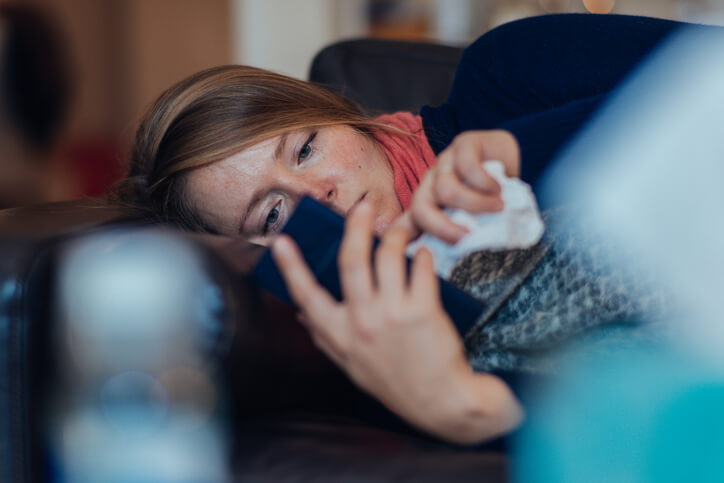Connect with a Baptist Health provider from the comfort of your own home with Virtual Care video and eVisits.
Don’t let the fear of exposure prevent you from getting the care you need.

A novel coronavirus is a new coronavirus that hasn’t been previously identified. The virus causing coronavirus disease 2019 (COVID-19) isn’t the same as the coronaviruses that commonly circulate among humans and cause mild illness, like the common cold. It’s important to be aware of this illness because of the rapidly changing information, the impact on your community, and being aware of the symptoms and how the virus spreads will help protect you and your family.
Coronaviruses are a large family of viruses. Some cause illness in people, and others, such as canine and feline coronaviruses, only infect animals. It’s rare, but animal coronaviruses have emerged to infect people and can spread between people. This is suspected to have occurred for the virus that causes COVID-19.
The virus was first detected in Wuhan City, Hubei Province, China. The first infections were related to a live animal market, but the virus is now spreading person-to-person.
The virus that causes COVID-19 seems to be spreading easily and sustainably in the community (“community spread”) in affected areas. Community spread means people have been infected with the virus in an area, including some who aren’t sure where or how they were infected.
A person who’s actively infected with COVID-19 can spread the illness to others. For this reason, the Centers for Disease Control and Prevention (CDC) recommends that these patients be isolated either at home or at the hospital (depending on how sick they are) until they’re better and no longer pose a risk of infecting others.
Experts are focused on slowing the spread by understanding how coronavirus spreads. By doing so, we can all take precautions to avoid contracting this illness and spreading it to others.
This is mainly how coronavirus is spread and there are several ways this can occur: droplets, airborne transmission, or surface transmission.
Community spread is when someone gets the virus without any known contact with a sick person. This could be because they are unaware of who transmitted the illness or an unknown person was asymptomatic.
Isolation is used to separate people infected with the virus (those who are sick with COVID-19 and those with no symptoms) from people who are not infected. People who are in isolation should stay home until it’s safe for them to be around others. In the home, anyone sick or infected should separate themselves from others by staying in a specific “sick room” or area and using a separate bathroom (if available).
How long someone is actively sick can vary so the decision of when to release someone from isolation is made on a case-by-case basis using these requirements:
Someone who has been released from isolation is not considered to be a risk to others.
Someone who’s been released from COVID-19 quarantine isn’t considered a risk for spreading the disease because they haven’t developed the disease during the 14-day incubation period.
Quarantine means separating a person or group of people, in order to prevent the possible spread of the disease. A quarantine is appropriate when one (or more) person has been exposed to a contagious disease, though not developed illness (symptoms), to avoid infecting others who haven’t been exposed.
For COVID-19, the period of quarantine is 14 days from the last date of exposure, because 14 days is the longest incubation period for similar coronaviruses.
Learn How to Maintain a Routine for Better Health
Currently, there’s no evidence to support transmission of COVID-19 associated with food. Coronaviruses are generally thought to be spread from person-to-person through respiratory droplets. As always, it’s important to wash your hands for 20 seconds before preparing food.
In general, because of the poor survivability of these coronaviruses on surfaces, there’s likely a very low risk of spread from food products or packaging that are shipped over a period of days or weeks at ambient, refrigerated or frozen temperatures.
There have been a few reports of pets being infected along with other animals kept in captivity. While not all of the Not all of the animals had signs of illness, some have had mild symptoms and it’s reported that coronavirus may have spread from close contact with humans who were infected.
It’s not yet known whether warmer temperatures will affect the spread of coronavirus. Other viruses, like the common cold or flu, spread more during the cold weather months, but it doesn’t mean it’s impossible to become sick with these viruses during hotter weather months.
As of now, there is a lot more to learn about the transmissibility, severity and other features associated with COVID-19 and investigations are ongoing.
Don’t let the fear of exposure prevent you from getting the care you need.
In order to protect yourself and other from coronavirus, you can practice the following:
Learn more about how to protect yourself from coronavirus.
As of Friday, July 10 at 5:00 p.m., Governor Andy Beshear announced a mandate that will require everyone to wear masks in Kentucky’s public spaces. Masks are mandatory in places like retail stores, restaurants, gyms, government buildings and any outdoor spaces where people are unable to stay six feet apart.
Face masks are now recommended for the general public in the United States for coronavirus protection. If you have respiratory symptoms like coughing or sneezing, experts recommend wearing a mask to protect others. Learn more about why experts recommend wearing a face mask to protect yourself against coronavirus. As experts continue to study the spread, we know there are is a significant number of individuals with coronavirus who lack symptoms (“asymptomatic”) and that even those who eventually develop symptoms (“pre-symptomatic”) can transmit the virus to others before showing symptoms. This means that the virus can spread between people interacting in close proximity—for example, speaking, coughing, or sneezing—even if those people are not exhibiting symptoms. In light of this, the CDC is recommending wearing cloth face coverings in public settings where other social distancing measures are difficult to maintain (e.g., grocery stores and pharmacies) especially in areas of significant community-based transmission.
To learn more about COVID-19 symptoms, prevention, and social distancing, please visit Baptist Health’s COVID-19 Facts and Resources page.
Sources:
CDC
WebMD
WHO (World Health Organization)

Trust Baptist Health to provide you with the reliable information you need to keep you and your family safe.
Read More